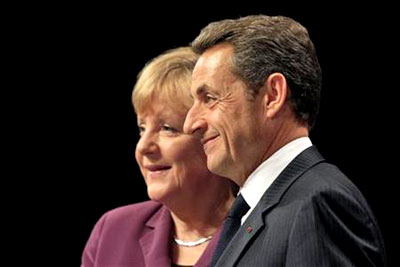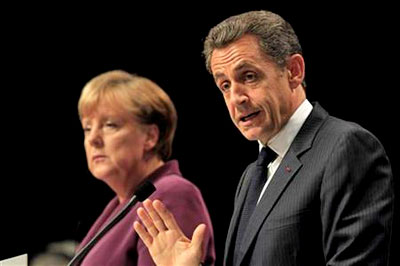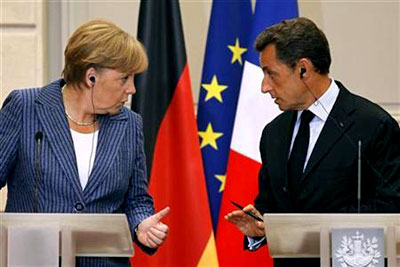
by Julien Toyer and Annika Breidthardt
November 9, 2011
from
Reuters Website
German and French officials have discussed plans
for a radical overhaul of the European Union that would involve setting up a
more integrated and potentially smaller euro zone, EU sources say.
"France and Germany have had intense
consultations on this issue over the last months, at all levels," a
senior EU official in Brussels told Reuters, speaking on condition of
anonymity because of the sensitivity of the discussions.
"We need to move very cautiously, but the truth is that we need to
establish exactly the list of those who don't want to be part of the
club and those who simply cannot be part," the official said.
French President Nicolas Sarkozy gave
some flavor of his thinking during an address to students in the eastern
French city of Strasbourg on Tuesday, when he said a two-speed Europe - the
euro zone moving ahead more rapidly than all 27 countries in the EU - was
the only model for the future.

France's President
Nicolas Sarkozy (R) and Germany's Chancellor Angela Merkel
attend a joint press
conference after crisis talks with Greece's Prime Minister
on the eve of a G20 summit of
major world economies in Cannes, November 2, 2011.


France's President Nicolas
Sarkozy (R) and German Chancellor Angela Merkel
talk during a news
conference at the Elysee Palace in Paris, August 16, 2011.
REUTERS/Charles Platiau
The discussions among senior policymakers in Paris, Berlin and Brussels
raised the possibility of one or more countries leaving the euro zone while
the remaining core pushes on toward deeper economic integration, including
on tax and fiscal policy.
The change has been discussed on an "intellectual" level but had not moved
to operational or technical discussions, the EU official said.
A French finance ministry spokesman denied there
was any project in the works to reduce the currency bloc's membership.
"There have been no conversations between
French and German authorities at any level on decreasing the size of the
euro zone," the spokesman said.
A radical overhaul of the European Union would
be opposed by many members.
"This will unravel everything our forebears
have painstakingly built up and repudiate all that they stood for in the
past sixty years," one EU diplomat told Reuters.
"This will redraw the map geopolitically and
give rise to new tensions. It could truly be the end of Europe as we
know it."
In Berlin, European Commission President Jose
Manuel Barroso warned about the economic costs of any splits in the euro
zone. Germany's gross domestic product could contract and its economy would
shed one million jobs, he said in a speech.
Barroso said any push toward deeper economic policy integration should not
come at the price of creating new divisions among EU members.
"There cannot be peace and prosperity in the
North or in the West of Europe, if there is no peace and prosperity in
the South or in the East," he said.
To an extent the taboo on a country leaving the
17-member currency bloc was already broken at the G20 summit in Cannes last
week, when German Chancellor Angela Merkel and Sarkozy both
effectively said that Greece might have to drop out if the euro zone's
long-term stability was to be maintained.
But the latest discussions among European officials point to a more
fundamental re-evaluation of the 12-year-old currency project - including
which countries and what policies are needed to keep it strong and stable -
before Europe's debt crisis manages to break it apart.
In large part the aim is to reshape the currency bloc along the lines it was
originally intended; strong, economically integrated countries sharing a
currency, before nations such as Greece managed to get in.
"In doing this exercise, we will be very
serious on the criteria that will be used as a benchmark to integrate
and share our economic policies," the senior EU official said.
One senior German government official said it
was a case of pruning the euro zone to make it stronger.
"You'll still call it the euro, but it will
be fewer countries," he said, without identifying those that would have
to drop out.
"We won't be able to speak with one voice and make the tough decisions
in the euro zone as it is today. You can't have one country, one vote,"
he said, referring to rules that have made decision-making complex and
slow, exacerbating the crisis.
Speaking in Berlin, Merkel reiterated a call for
changes to be made to the EU treaty - the laws which govern the European
Union - saying the situation was now so unpleasant that a rapid breakthrough
was needed.
From Germany's point of view, altering the EU treaty would be an opportunity
to reinforce euro zone integration and could potentially open a window to
make the mooted changes to its make-up.
EU officials have told Reuters treaty change will be formally discussed at a
summit in Brussels on December 9, with an 'intergovernmental conference',
the process required to make alterations, potentially being convened in the
new year, although multiple obstacles remain before such a step is taken.
ACCELERATION
While the two-speed Europe referred to by Sarkozy is already reality
in many respects - and a frustration for the likes of Poland, which hopes to
join the euro zone - the officials interviewed by Reuters spoke of a more
formal process to create a two-tier structure and allow the smaller group to
push on.
"This is something that has been in the air
for some time, at least in high-level talks," said one EU diplomat. "The
difference now is that some countries are moving forward very quickly... The risk of a split, of a two-speed Europe, has never been so real."
In Sarkozy's vision, the euro zone would rapidly
deepen its integration, including in sensitive areas such as corporate and
personal taxation, while the remainder of the EU would be left as a
"confederation", possibly expanding from 27 to 35 in the coming decade, with
enlargement to the Balkans and beyond.
Within the euro zone, the critical need would be for core countries to
coordinate their economic policies quickly so that defenses could be erected
against the sovereign debt crisis.
"Intellectually speaking, I can see it
happening in two movements: some technical arrangements in the next
weeks to strengthen the euro zone governance, and some more fundamental
changes in the coming months," the senior EU official said.
But he cautioned:
"Practically speaking, we all know that the
crisis may deepen and that the picture can change radically from one day
to another."
France and Germany see themselves as the
backbone of the euro zone and frequently promote initiatives that other euro
zone countries reject.
The idea of a core, pared-down euro zone is
likely to be strongly opposed by the Netherlands and possibly Austria,
although both would be potential members.
"This sort of thinking is not the direction
we want to go in. We want to keep the euro zone as it is," said a non
Franco-German euro zone diplomat.
Britain, which is adamantly outside the euro
zone, is also opposed to any moves that would create a two-speed
Europe, or institutionalize a process even if it is already under way.
"We must move together. The greatest danger
we face is division," Britain's deputy prime minister, Nick Clegg, said
during a visit to Brussels on Wednesday.



